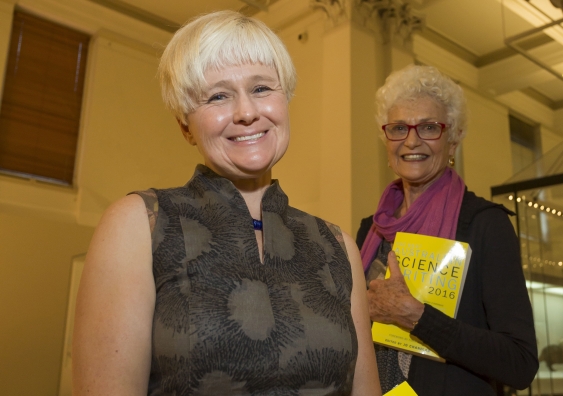Essay on eucalypts wins science writing prize
The Bragg UNSW Press Prize for Science Writing has been awarded to author Ashley Hay for her article The Forest at the Edge of Time, about the threat to eucalypts from climate change.
The Bragg UNSW Press Prize for Science Writing has been awarded to author Ashley Hay for her article The Forest at the Edge of Time, about the threat to eucalypts from climate change.

Deborah Smith
UNSW Media
9385 7307 or 0478 492 060
deborah.smith@unsw.edu.au
The Bragg UNSW Press Prize for Science Writing has been awarded to author Ashley Hay for her article The Forest at the Edge of Time on the threat to eucalypts from climate change.
The $7000 prize was announced by eminent epidemiologist and former Australian of the Year Professor Fiona Stanley AC at a ceremony hosted by UNSW Press and UNSW Science, held on Thursday night at the Australian Museum.
Runners-up prizes of $1500 each were also awarded to Susan Double for her article Beautiful contrivances, on the sexual deceit of orchids, and to Fiona McMillan for her article Lucy’s lullaby: Song for the ages, on human evolution and childbirth.
The winning works appear in The Best Australian Science Writing 2016, the sixth in an acclaimed series of anthologies published by NewSouth Books, which contain short non-fiction pieces of writing about science for a general audience.
This year’s edition was edited by Walkley Award-winning journalist and author Jo Chandler, who was the recipient of the 2014 Bragg prize.
Professor Stanley, who is Founding Director and Patron of the Telethon Kids Institute, said it was vital that people were engaged with science so they could make decisions about challenges such as climate change, environmental degradation and health issues.
“Getting information out in a way that is exciting, either on TV or on radio or in good writing like this, enables democracy,” she told the audience of more than 100, which included leading science writers, journalists, broadcasters and researchers.
Professor Stanley, who also wrote the foreword to the book, commended UNSW for establishing the anthology and the prizes for writers and students. “I believe giving awards is a great thing for encouraging young people in science, particularly in years 7 to 10.”
She said Ashley Hay’s winning entry was an incredibly important essay: “It was chilling, but beautifully told.”
And it gave her enormous pleasure to launch the anthology: “The stories in this book are absolutely fantastic. I can’t think of one of these essays that didn’t inspire me, make me laugh, feel cross, or in some way get me really engaged with the science.
“They are all well written. There is a huge variety of scientific topics. They demonstrate how science is a vital, living part of our culture as well as essential for our health, well-being, our innovation and so much more,” Professor Stanley said.
UNSW Press chief executive officer Kathy Bail thanked the Copyright Agency Cultural Fund for its support, Refraction Media, Jo Chandler, Professor Stanley and the Bragg prize judges: Professor Merlin Crossley, Dr Cathy Foley and Dr Graeme Pearman.
Acting Dean of Science Professor Peter Lovibond thanked the science writers and journalists present for their efforts informing the public about scientific issues and discoveries.
UNSW President and Vice-Chancellor Professor Ian Jacobs presented the UNSW Bragg Student Prize for Science Writing, an initiative of UNSW Press, UNSW Science and Refraction Media.
The winner, Marissa Petrakis from Meriden School, and the two runners-up, Chelsy Teng from James Ruse and Gemma Macauley-Black from Frensham School, were present at the event to receive their awards.